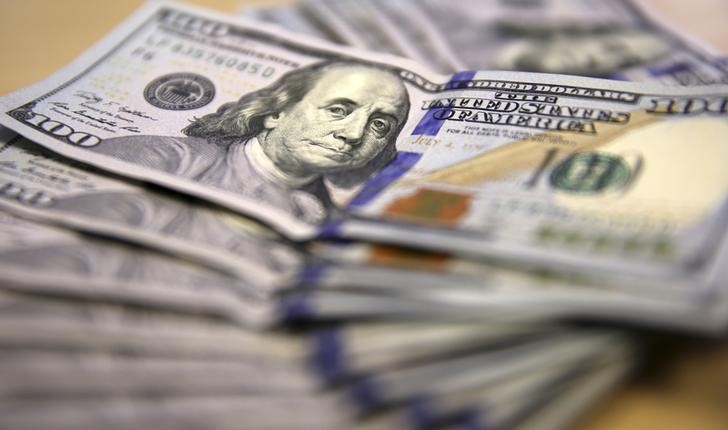By Gertrude Chavez-Dreyfuss and Anirban Nag
NEW YORK/LONDON (Reuters) - Most bouts of global market volatility in recent years have featured one constant: the U.S. dollar strengthens as investors clamor for the perceived safety of U.S. assets such as Treasuries.
By contrast, over the last two previous trading days, the dollar lost 4.0 percent against the yen, while dropping to a seven-month low versus the euro on Monday, as world stock markets slumped and emerging market currencies plummeted.
The dollar's weakness may continue in the short term, but analysts expect its longer term rally to continue eventually.
The greenback is still seen as a refuge for those with the closest links to China such as companies and investors operating in Australian, Canadian, and New Zealand dollars as well as a slew of emerging market currencies.
In the short term, two factors may be pressuring the dollar against the euro and yen.
First, an accelerating economic slowdown in China and the resulting volatility in global markets have lowered expectations for a Federal Reserve interest rate rise in September, undermining the attractiveness of U.S. dollar assets.
Second, the slump in world stock markets appears to be spooking traders into unwinding "carry trades" financed largely in low-yielding euros and yen.
"Global risk is elevated right now and so the Federal Reserve would be cautious in hiking interest rates," said Stephen Jen, a partner at global macro hedge fund SLJ Partners in London. "That support for the dollar is not there at the moment."
DOLLAR HIT BY WANING EXPECTATIONS FOR FED RATE RISE
In the past year, the U.S. dollar index (DXY) gained about 12 percent, as investors priced in a rise in short term interest rates by the Fed.
But China's economic slowdown fanned fears of a global slowdown, lowering demand for commodities. A key commodity price index hit a 12 year low (TRJCRB) this week and emerging market stocks and currencies also slumped.
U.S. and European companies which earn revenues in China have also seen their stock prices fall, contributing to the slump in major world stock markets. The benchmark U.S. S&P 500 index has lost more than 12 percent since a May high.
The potential impact of a China slowdown and the resulting global market volatility has cast doubt on the likelihood of a Federal Reserve interest rate rise in September.
Barclays (LONDON:BARC) Bank for example this week changed their forecast on the timing of a Fed rate increase to March 2016 from their earlier call of September, saying that the Fed is "unlikely to begin a hiking cycle in this environment for fear that such a move may further destabilize markets."
Should market conditions stabilize and prove transitory, Fed policy-makers could the end its near zero interest rate policy at their December meeting, they said.
UNWINDING OF CARRY TRADES ALSO UNDERMINES USD
The U.S. dollar was also hit in the past few days by traders closing out carry trades in yen and euro in order to protect themselves against further market volatility.
The dollar's slump against the yen was not a surprise since Japan's lower interest rates mean the yen has traditionally been used to fund carry trade investments in higher-yielding assets. In times of financial stress, investors unwind those bets by selling the risky assets and buying back the funding currency.
The fall against the euro is more unusual, as the euro zone debt crisis in the past few years made the euro an unattractive candidate for a carry trade until the European Central Bank's asset purchase program lowered euro zone interest rates and eased investor fears about European economic growth.
The options market, in the near-term, sees more U.S. dollar weakness. The "skew", a measure of what people are paying for bets on a currency rising or falling, shows expectations for more weakness in the dollar against the euro than at any time in the last year
"It looks too early to argue that the current financial storm has blown itself out," said Chris Turner, global head of strategy at ING in London.
"The uncertainty about the end-point for this Chinese yuan devaluation remains."
LONGER TERM OUTLOOK FOR U.S. DOLLAR GOOD
Despite the dollar's recent weakness against the euro and the yen, it remains a haven for investors and companies deriving revenues from China by selling commodities from Canada, Australia, as well as for emerging market countries whose currencies have fallen sharply recently.
Given that U.S. economy continues to grow steadily, making a Fed interest rate likely in the not too distant future, the dollar is likely to resume its uptrend of the past year, analysts said.

"The euro is no safe haven," said SLJ Partners' Jen. "I expect euro/dollar to top out when the world realizes that European companies are very exposed to emerging markets, more than the United States is."